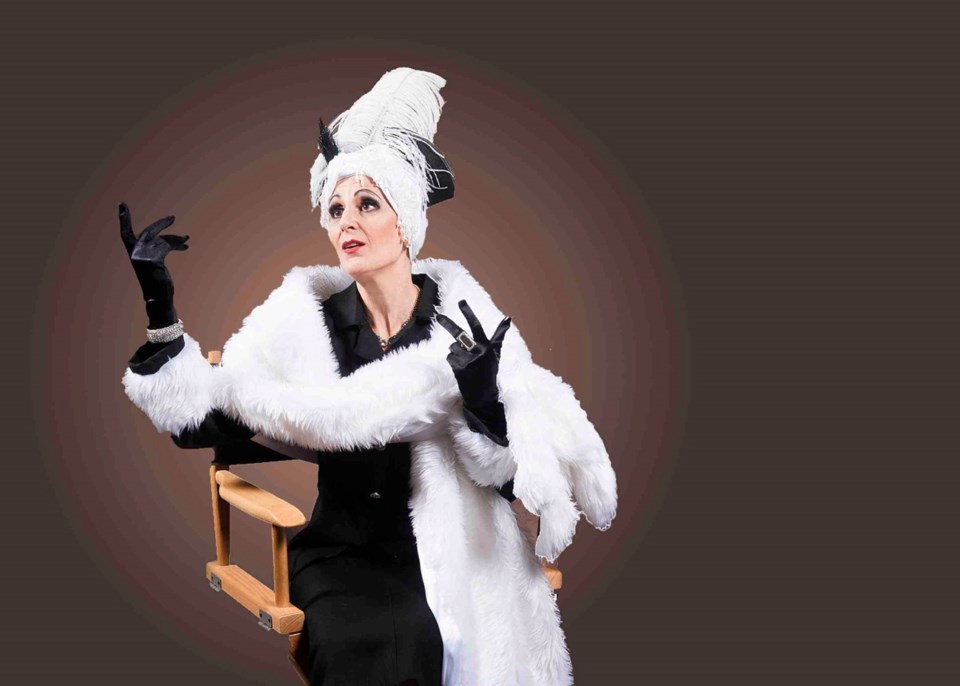What: Sunset Boulevard
Where: McPherson Playhouse
When: To May 14
Rating: five stars (out of five)
For many years, the camp image of Gloria Swanson as faded film siren Norma Desmond wafting down the staircase has been fodder for lampooning. For those of a certain age, it’s impossible to hear the words “I’m ready for my closeup” without remembering Carol Burnett’s send-up of Sunset Boulevard’s most iconic scene.
The comedy cliché has endured because the film is so powerful. It’s curiously refreshing to revisit the tale in Andrew Lloyd Webber’s 1993 musical adaptation of the film. Witnessing this familiar narrative, we’re reminded how potent and unsettling it truly is.
The Victoria Operatic Society has opened a first-rate revival of Sunset Boulevard that’s worth seeking out. Skillfully directed by Heather-Elayne Day, this briskly paced production succeeds on every level: first-rate performances, superior production values, fine costumes, wonderful attention to detail overall. Indeed, this one of the strongest VOS shows I’ve seen.
Sunset Boulevard is a case study in unhealthy relationships. Norma — played by Francesca Bitonti with confidence and brio — is particularly bad news. Once a silent movie heroine, and now forgotten by the public, she’s atrophied into a quivering pool of neuroticism. Norma, closeted in her decaying Los Angeles mansion, forges an unholy alliance with struggling screenwriter Joe Gillis (Jeffrey Stephen). Ensnared like a beetle in a tarantula’s web, he’s enlisted to rewrite her comeback script. Soon Joe makes the devil’s bargain, becoming Norma’s gigolo (despite their considerable age difference) in return for a luxurious lifestyle.
The possibility of redemption hovers tantalizingly in the shape of Betty (Ashley King) , a wholesome script editor who’s willing to dump her fiancé for Joe. Unfortunately, Norma’s boy-toy has a fatal flaw — his unwillingness to give up magnums of champagne and cheekfuls of caviar.
Ambitiously, the VOS gang has opted for fully-staged version of the musical. And, almost miraculously, they’ve pulled it off. It’s no easy feat.
On Friday night. the audience marvelled at the monumental curved staircase (almost a character in itself) with its faux-marble detail and art-deco lamps. There’s an organ with giant pipes and an opulent recreation of Norma’s Isotta Fraschini automobile, cleverly outfitted with screens so we see the actors’ bodies when they’re inside. Elsewhere, Schwab’s diner is a retro wonder with its vintage counters and stools.
Jason King’s videos and projections are accomplished — we see black-and-white car chases through Hollywood (really the Uplands), footage of 1950s Los Angeles and the eerie repeated image of one character at the bottom of a swimming pool. It’s impressive stuff, created with bona fide wit and artistry.
Throughout, the visual aspects of this show are of a professional calibre. The wonder of community theatre is the willingness of volunteers to pitch in. In this case, a whopping 99 signed up for Sunset Boulevard, and the results are readily apparent onstage.
Bitonti is a VOS veteran well able to fit into Norma’s larger-than-life shoes. She captured the character’s immensity through expressive gesture and facial expressions. At the same time, she was never over-the-top. Bitonti brought out Norma’s fragility and neuroticism, her petulant willingness to manipulate others.
Her singing was strong — stand-out numbers included the melodic New Ways to Dream and As If We Never Said Goodbye, in which Norma muses on her imagined return to Hollywood. For the operatic mad scene concluding the show, Bitonti — wearing a glittering headress — sinuously descended the staircase, once again fully mining the bigness of her character while also portraying nuance and complexity.
Stephen was equally convincing as Joe, offering powerful singing while finding the world-weary resignation within the character. Robert Mitchell was a strong presence as Max, Norma’s long-suffering lackey. With such songs as New Ways to Dream, he displayed a knack for phrasing and dynamics, knowing when to swell into a crescendo/decresendo and when to project with a theatrical flourish.
The show benefits from a 19-piece pit orchestra, conducted by Tom Mitchell. At times, the percussion seemed overly loud, perhaps a drum screen or brushes might help. The musicians did quite well in navigating a dense and rhythmically tricky score, one of Webber’s more complex efforts.
